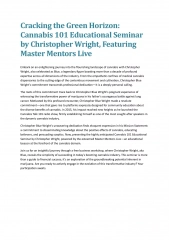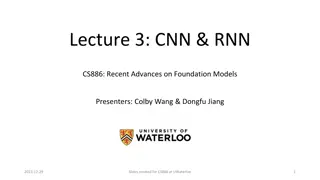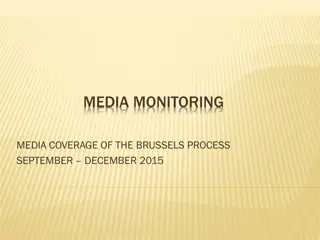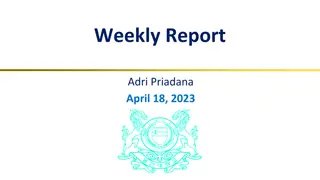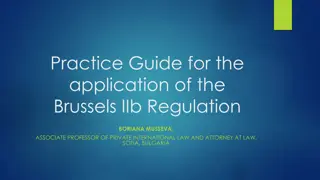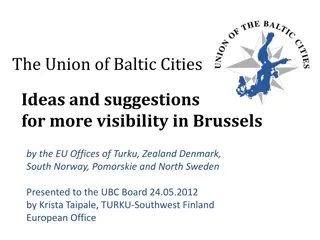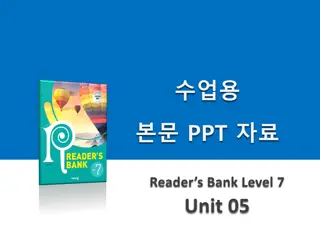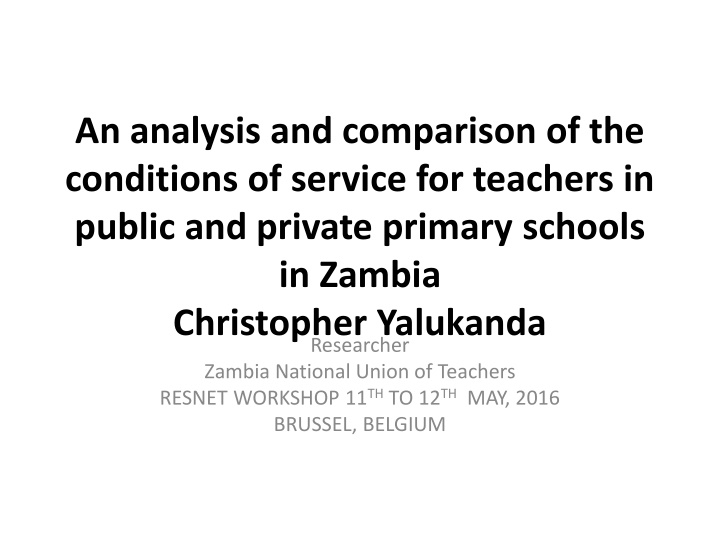
Comparison of Teacher Conditions in Public vs. Private Primary Schools in Zambia
Explore the discrepancies in working conditions and qualifications between teachers in public and private primary schools in Zambia, shedding light on potential implications for policy-making and educational standards.
Download Presentation

Please find below an Image/Link to download the presentation.
The content on the website is provided AS IS for your information and personal use only. It may not be sold, licensed, or shared on other websites without obtaining consent from the author. If you encounter any issues during the download, it is possible that the publisher has removed the file from their server.
You are allowed to download the files provided on this website for personal or commercial use, subject to the condition that they are used lawfully. All files are the property of their respective owners.
The content on the website is provided AS IS for your information and personal use only. It may not be sold, licensed, or shared on other websites without obtaining consent from the author.
E N D
Presentation Transcript
An analysis and comparison of the conditions of service for teachers in public and private primary schools in Zambia Christopher Yalukanda Researcher Zambia National Union of Teachers RESNET WORKSHOP 11THTO 12THMAY, 2016 BRUSSEL, BELGIUM
PRESENTATION OUTLINE Presentation outline Aim of the study Introduction Why this study Research Questions Methods Data Collection and analysis Results Findings Conclusion
Aims of the study To analyses and compares the conditions of services(Terms and Conditions of service) for primary school teachers in public and private primary schools in Lusaka district of Zambia. To investigate the professional qualifications of teachers in private schools. The focus was on teachers in low and medium cost primary schools.
Introduction Conditions of service are at the core of paid work and employment relationships. In this study conditions of service refer to; that part of an employment that sets out the duties, responsibilities, hours of work, salary, allowances, Medical, leave and other privileges to be enjoyed by persons employed, as well as the physical conditions and mental demands that exist in the workplace. Conditions of services in this study will be as defined in collective agreements signed between teacher unions in 2013. Little or no research done in Zambia on the conditions of service for teachers in Private schools.
Why this study? The findings inform unions, governments and private sector about the of existing salaries and conditions of service contribute to the harmonization of salaries-equal pay for equal work and qualifications Promote unionisation of teachers in private schools and promote trade union rights It will help to demystify the bad perception attached to public schooling.
Hypothesis Teachers in private schools have better Conditions of service and better qualified than those in public schools.
Research Questions How do the conditions of service for teachers in private primary schools compare to those in public primary schools? What are the professional qualifications of teachers employed in private primary schools? Are there similarities conditions of services and qualifications between teachers in private and public primary schools. and differences in
Methods Participants- 60 classroom teachers purposely selected ensure that only teachers from low and middle cost schools participated Age; Mean=35.2, SD=9.404 Gender; Male=28, Female=34 20 Headteachers were interviewed Data Collection Instruments designed by the researcher were used- A questionnaire for teachers and a fact sheet Headteachers for interviews
Data Collection and Analyse Data was collected by 3 trained Research Assistants recruited from the University of Zambia- undergraduate students between 1st December 2015 and 30th January, 2016 Data was coded and analysed using SPSS 22 to come up with Descriptive frequencies, percentages and figures and tables.
Results- Agent or proprietor
Compensation for non teaching responsibilities
Types of Leave Table: Type of leave and Percentages of teachers accessing ________________________________________________________________________________ Type of leave No. Percentage ________________________________________________________________________________ Paid study leave 60 Unpaid study leave 60 Vocational leave 60 Maternity leave 60 Paternity leave 60 Special leave 60 Convalescence leave 60 Urgent leave 60 None 60 _________________________________________________________________________ 16.4 14.8 36.1 41.0 6.6 9.8 0 39.3 0
Other Benefits & Allowances Table. Other benefit and allowances for teachers in private schools ________________________________________________________________________________ Benefits No. Percentage ________________________________________________________________________________ Health/ Medical Insurance 60 Disability Insurance 60 Funeral Assistance 60 Pension scheme 60 Unemployment 60 Holiday pay 60 Life Insurance 60 Transport 60 Housing Allowance 60 Responsibility Allowance 60 Double class allowance 60 ________________________________________________________________________________ 13.1 0 72.0 31.7 0 57.2 1.6 23 29.5 11.5 9.8
Working conditions 63.3% =Working Conditions determined by Employers 18. 3%= contained in individual contracts 18.3%= Conditions are reviewed annually All teachers in the study are not unionised. 43.3% =20-30 learners in their class Working hours per week-78.6%= 40hrs per week Basic Salary per month= 45% of teacher s salaries are below 1500 kwacha. Only 16% get above 3000kwacha- Minimum wage for Non-unionised workers set by the tripartite 71.7%= Salary paid on time and 28.3% not paid on time
Findings Teachers in Private are not Unionised No collective bargaining existing in private schools- all salaries and conditions of service determined by employers The majority of teachers salaries are below the minimum wage of 3000 kwacha as stipulated by Zambian industrial and Labour laws Charge very low fees range fro 735 to 3900 kwacha. Majority of jobs are contractual and not pensionable
Most private schools are not abiding by the Labour laws on maternity leaves for non- unionised worked of 120 days Most low and medium cost school not registered with Government and operate illegally
Limitations Small sample size to draw conclusions Research setting was limited to Lusaka Private proprietors not cooperating when it comes to research on conditions of service Recommendations Further research with a bigger sample size Research on conditions of service for school Headteachers

